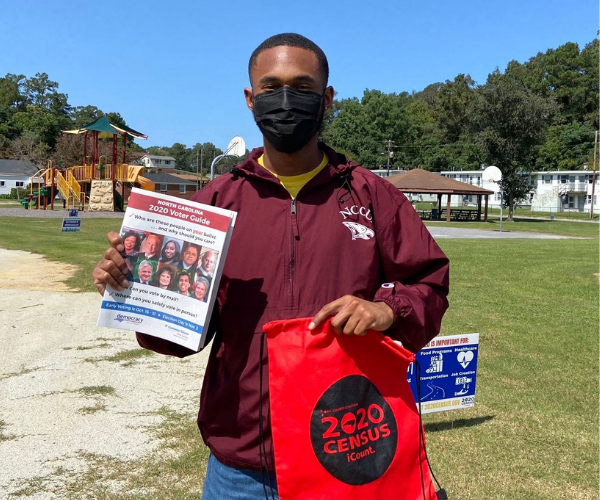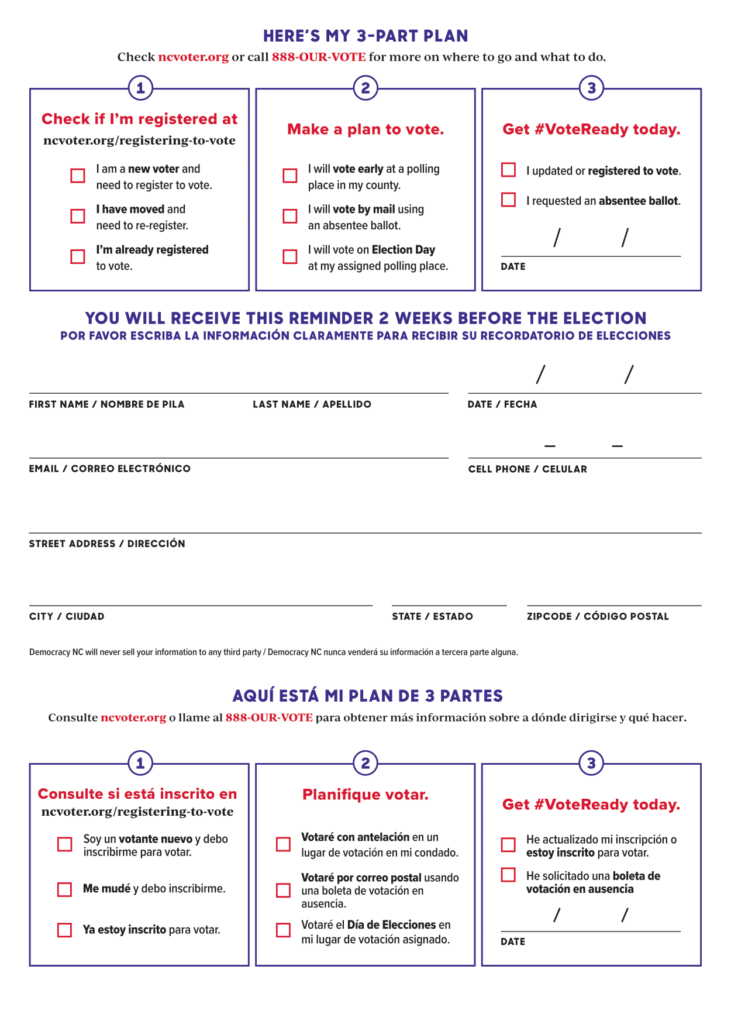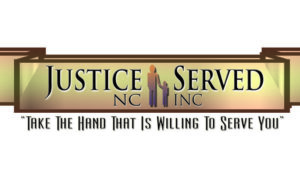

Democracy North Carolina
For over 25 years, Democracy North Carolina has used research, organizing, and advocacy to increase voter participation. Their mission is to strengthen democratic structures, build power among disenfranchised communities, and inspire confidence in a transformed political process that works for all. Their focus on community-based leadership is reflected in their training approach and choice of sites for nonprofit voter engagement work.
See the list of collaborating organizations below.

“People do want to vote once they understand the power of our vote and that they have a voice. But those barriers are there.”
Justice Served NC, Inc. on addressing barriers (like obtaining Voter ID and feeling like their vote doesn’t matter) with the formerly incarcerated individuals they serve.
Collaborating Organizations: A Better Chance A Better Community, New Day Outreach Center, Bertie County NAACP, Blazing Beauties, Brick Capital CDC, Charlotte NCNW, Churches Outreach Network Interfaith Clergy, CORAS, Cumberland Health Net, Delta Sigma Theta Enfield-Roanoke Rapids, El Vinculo Hispano / The Hispanic Liaison, Food Bank of Central & Eastern North Carolina, Gladys Rogers Darensburg Foundation, HOLLA CDC, Interfaith Clergy, Justice Served NC, Inc., Kinston Teens, Inc., MANNA Foodbank, Meals on Wheels Wake County, Ministers Conference of Winston Salem & Vicinity, NC 100, NC C.I.V.I.L, New Creation Apostolic Worship Tabernacle, Parkway United Church of Christ, Pisgah Legal Services, Project Cover, Raleigh-Apex NAACP, Raleigh Foodbank, Rural Health Group, Saint James Presbyterian Church, Scotland Neck Community Task Force Team, Second Harvest, Spirit and Truth UM Church, Sunshine Station, Inc., The Tipping Point, United Health Centers, WNCAP, and YWCA of Asheville
Pledge-to-Vote Card
In addition to asking people to register to vote, sites used this pledge-to-vote card that was customized for their state. Features of this card include:
- Plan to vote prompts
- English/Spanish translations
- Link to registration portal
Learn more about creating pledge-to-vote cards in the Methods section of the Practitioner’s Report.

Site Case Study

About
Justice Served works to prevent individuals from being entangled in the criminal justice system. They work with adults who were formerly incarcerated to restore their rights, families who have been impacted by the criminal justice system, and young people (14-24) in North Carolina guiding them to be successful in life through a curriculum and variety of opportunities. One of their programs is offering assistance with re-entry for formerly incarcerated individuals including assisting with fees or fines and helping individuals get a state ID or a driver’s license.
Why Justice Served Engages Voters
Engaging voters is central to building community for individuals who have been impacted by the criminal justice system. Whether they or a family member was incarcerated, including voter registration in their re-entry programs and informing voters about the process lets them know their voice can be heard by casting a ballot. Justice Served recognizes they can play a role by addressing structural barriers and connecting voting to real change in their neighborhoods.
Key Takeaways
In order to effectively engage voters, Justice Served NC makes sure the needs are met of the formerly incarcerated individuals they serve. They do this by addressing both structural barriers like obtaining Voter ID and psychological barriers such as feeling like their vote doesn’t matter.
Voting after Rights Restoration
In North Carolina, individuals serving a felony sentence lose their right to vote until their sentence is completed. To register to vote, individuals can not currently be serving a felony sentence, including any probation, post-release supervision, or parole. Many formerly incarcerated individuals are unaware they are able to register and vote. Once they do know, they face other hurdles like not having proper photo ID. Justice Served’s re-entry program helps voters by addressing these barriers.
“We are finding more and more that as people are released from prison, they are not coming out with the credentials they need to function in the real world. One of those things is having a voter ID, state ID, or driver’s license. We help people get one by paying their fines and fees. People do want to vote once they understand the power of our vote and that they have a voice. But those barriers are there. And so those barriers can discourage them,” says Diana Powell, the Executive Director of Justice Served for NC.
Another barrier formerly incarcerated individuals face is feeling like their vote doesn’t matter. “A lot of people in the black and brown community lost that hope in understanding that the power of a vote is our voice. And I think when you get young people involved, it encourages the older people to get involved,” remarks Diana. The 22 members of the Justice Served youth program played a huge role in the success of their voter engagement efforts. Because many were not yet eligible to vote themselves, they encouraged others to vote.
Justice Served held a block party to share information about voting with the community. Diana stated, “I saw that when you get young people engaged, it does something to the older generation. I saw older people up there dancing because they looked at the youth and were like, okay, I feel energized! It was just so inspiring to have that. It was awesome.” As part of the block party, they had a balloon release in recognition of those still incarcerated and unable to vote.
“We did it to send a message inside and it was so moving, especially to the families that had loved ones that are incarcerated. It was like saying, I’m standing up and I’m supporting them, even though they may feel like they’re all alone and that there’s no one out there fighting for them.”
After the election passed, Diana remarked, the young people were still ready, asking when they could get back out there and help register people to vote. Formerly incarcerated individuals face a lot of misinformation. Between 2016 and 2020, 13 states have expanded voting rights for people with a felony conviction. However, there’s not a lot of guidance on how information about voting is distributed once individuals are released from prison. Organizations like Justice Served for NC ensure that those entangled in the criminal justice system are aware of their rights and provide the support they need.
